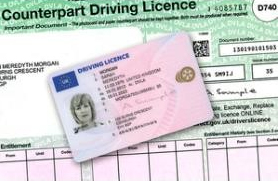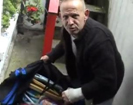Gear Change For Drivers
Photocard driving licences have been issued in the UK since 1998. Until recently the DVLA also included a paper ‘counterpart’ – which detailed the classes of vehicle that the holder could legally drive and also showed any endorsements (points) issued for driving offences. However, since 8 June 2015 the DVLA no longer issue these and from that date existing paper counterparts will no longer be valid either, leaving the photocard as the sole licence documentation. The move is part of the Government’s ‘Red Tape Challenge’ initiative to remove unnecessary burden.

The DVLA advise drivers to destroy their counterpart after this date – but some lobby groups don’t agree, citing that use of the document could still be useful when hiring a vehicle abroad for example. Paper only driving licences (issued before the photocard was introduced) remain valid and should not be destroyed. The only free way for drivers to now check the type of vehicles that they can legally drive, and any endorsements (penalty points) that they have on their licence, is by viewing their driving document record online at www.gov.uk/view-driving-licence.
Enquiries can also be made by phone or post but both will incur a charge of about £5. Similar facilities have also been made available for employers and car-hire companies to check the details of an individual as and when required. Further information on the new system is available at www.gov.uk/government/news/driving-licence-changes
Illegal Pedlars Should Get On Their Bikes
With the warmer months and lighter evenings upon us at long last we can expect to see an increase in the number of door-to-door sellers around our streets. Some may well be genuine pedlars, trying to make an honest living. Others, however, might not. Especially, maybe, those that spin a yarn to entice you to take pity on their predicament and/or are a little too persistent in their sales pitch. Worse still is the possibility that a few might be intent on taking advantage of vulnerable residents and even committing distraction theft from their homes. But how can one tell the good from the bad?

Well it may be hard, but a good place to start is by asking to see their Pedlar’s Certificate (which is clearly titled as such – not ‘Hawker’s Identification’ or anything similar). This, according to the Pedlars Act 1871, they require to lawfully carry out their trade of selling door to door. It is issued annually, by the police, in the home district of the pedlar, and must be shown to anyone asking to see it. Any pedlar not being able or willing to do so could be up to no good – and should certainly be reported to the police on the non-emergency 101 number. Similarly the police should be alerted if sellers are operating after dark, ignoring ‘No Cold Caller’ stickers or seem suspicious in any other way. And don’t forget to say that you are a NHW member when calling the police.
Lorry Watch
Are your local streets plagued with lorries that shouldn’t be using them? If so Lorry Watch could help. Lorry Watch is a Kent County Council backed scheme run by local residents – see www.kent.gov.uk/roads-and-travel/travelling-around-kent/lorries-and-hgv/lorry-watch – in which community volunteers record details of lorries that are suspected of using unsuitable roads or not sticking to limits and restrictions imposed through Byelaws and Traffic Orders.
Once the information is collected, it is passed to Kent Police who can find the vehicle’s registered keeper. If the vehicle is ignoring legal limits and restrictions, the police contact the company and warn them that continuation may result in formal action. If there are no restrictions but the road is thought unsuitable, Kent County Council will contact the company and advise them to use the Kent Freight Gateway journey planner – an internet facility designed specifically to assist users of large vehicles.
Setting up a Lorry Watch is a simple process, anyone can do it. You just need at least 2 volunteers, aged 18 or over, for your Lorry Watch team. Parish Councils or other community groups can be good places to find volunteers. Then contact Lorry Watch, by emailing freight@kent.gov.uk or phoning 03000 412457, to discuss the idea. KCC will arrange delivery of the necessary equipment and give you safety information and instructions on how the scheme works. Pressure Mounts For Action On Lock-Snapping
ACTION FRAUD Messages
People looking for cheap flight tickets are being targeted by fraudsters. New websites are continuously being created with slight changes to the company names with the intention to deceive the public. They offer tickets at bargain prices and usually request for payment via bank transfer. These tickets do not materialize and the funds are retained by the fraudsters.
Protect yourself:
Where possible, buy from well-known company names. If you’ve never heard of a company, conduct some due diligence. Use the internet. Type the name of the company/site you are buying from and look for reviews of what others customers are saying about the company. Bad customer service feedback usually finds their way online quite quickly.
Use companies that are ATOL or ABTA Registered. You can check this here: http://abta.com/go-travel/before-you-travel/find-a-member Or http://www.caa.co.uk/application.aspx?catid=490&pagetype=65&appid=2
Check the authenticity of flight booking websites before making any reservations. A “who is” search on the website will identify when the website has been created, so be wary of newly formed domains. This search can be conducted using http://who.is
Royal Mail Email Scam
Never send money to bank accounts. If possible pay using a credit card – that way you have some protection and avenue for recompense.
A scam email is currently being sent to victims fraudulently claiming to be from the Royal Mail. Attached to the email is the CryptoLocker virus.
The victim receives an email purporting to be from the Royal Mail stating that they are holding a parcel/letter for the victim. The victim is then required to contact the Royal Mail to arrange for the item to be resent/collected.
By following the instructions within the email the CryptoLocker virus is subsequently downloaded to the victim’s computer. This virus encrypts files on the victim’s system and requests a ransom be paid in order for the files to be decrypted.
Additional incentive is added for early repayment as the ransomware states that the cost of decrypting the files will increase the longer the fine is outstanding.
Protect yourself:
- Look at who the email is addressed to. Is it generic or specifically addressed?
- Look at the quality of the images included on the email. Are they of sufficient high quality to come from Royal Mail?
- Do not open attachments from unsolicited emails regardless of who they are from.
- Do not click on the link supplied. Instead, go to the relevant website and log in from there.
- Check the address of any email received to see if it appears legitimate.
If you believe that you have been a victim of fraud you can report it online http://www.actionfraud.police.uk/report_fraud or by telephone 0300 123 2040.
Useful Contacts:
- www.ucanpreventcrime.co.uk/NHW – C&DNHWA
- www.canterburycsp.org.uk – Community Safety Partnership
- www.hoax-slayer.com – Online Protection Advice.
- www.scambusters.org – Online Protection Advice
- environmentalhelpdesk@canterbury.serco.com – Fly-Tipping
- www.ourwatch.org.uk – National NHW
- www.firekills.gov.uk – Fire Safety
- www.thinkuknow.co.uk – Child Internet Safety.
- www.ageuk.org.uk – Age
- www.actionfraud.police.uk – Report Fraud


